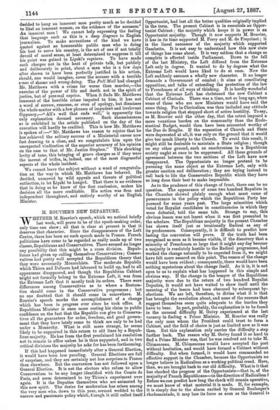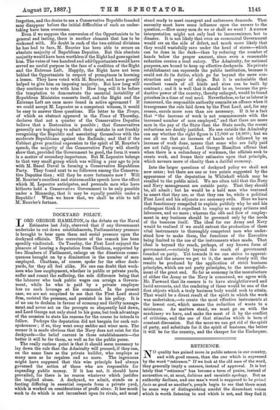M. ROUVIER'S NEW DEPARTURE.
-vv-HETHER M. Rouvier's speech, which we noticed briefly last week, will prove to be of the epoch-making order, only time can show ; all that is clear at present is that it deserves that character. Since the disappearance of the Left Centre, there has been no such speech made in France. French politicians have come to he regarded as really made up of two classes, Republicans and Conservatives. There seemed no longer any possibility that this might be a cross division. Repub- licans had given up calling themselves Conservatives ; Conser- vatives had pretty well accepted the Republican theory that they were necessarily Monarchists. The moderate Republic which Thiers and Dufaure had laboured to build up, had to all appearance disappeared, and though the Republican Cabinet might not formally belong to the Extreme Left, it was from the Extreme Left that it mostly took its orders. There were differences among Conservatives as to where a Restora- tion should come in the Conservative programme ; but no one doubted that it should come in somewhere. M. Rouvier's speech marks the accomplishment of a change which has been in progress ever since he took office. A Republican Minister is once more resting his claim to public confidence on the fact that the Republic can give to Conserva- tives all the guarantees for order, freedom, and good govern- ment that they have lately come to think are only to be had under a Monarchy. What is still more strange, he seems likely to be supported in this return to old lines by a Repub- lican majority. He has from the first proclaimed his resolution not to remain in office unless he is thus supported, and in two critical divisions the majority he asks for has been forthcoming.
If this had happened immediately after a General Election, it would have been less puzzling. General Elections are full of surprises, and they are certainly not less surprises in France than elsewhere. But the conversion has not followed upon a General Election. It is not the electors who refuse to allow Coaservatism to be any longer identified with the Comte de Paris, and seem determined to try Thiers's experiment over again. It is the Deputies themselves who are animated by this new spirit. The desire for moderation has arisen among the very men who, down to this year, seemed wedded to the narrow and passionate policy which, though it still called itself Opportunist, had lost all the better qualities originally implied in the term. The present Cabinet is in essentials an Oppor- tunist Cabinet ; the majority which keeps it in power is an Opportunist majority. Though it now supports M. Bouvier, it has in its time supported M. Ferry and M. de Freyeinet ; it is the lineal successor of the majority which supported Gambetta. It is not easy to understand how this new state of things has come about. It is very seldom that a change so complete is effected inside Parliament. Down to the fall of the last Ministry, the Left differed from the Extreme Left only in degree. It wanted to do by degrees what the Extreme Left would have liked to do at once. Now the Left suddenly assumes a wholly new character. It no longer demands a Government of combat ; it aims at conciliating opposition, and talks of extending the protection of the law to Frenchmen of all ways of thinking. It is hardly wonderful that the Extreme Left has christened the new Cabinet a Cabinet of Clericals. There was a time, not so long ago, when some of those who are now Ministers would have said the same thing. For in Clericalism was then included any attitude towards religion that stopped short of active hostility. To say, as M. Bouvier said the other day, that the octroi imposed a more vexatious burden on the community than the Eccle- siastical Budget, would then have been accounted worthy of the Dno de Broglie. If the separation of Church and State were deprecated at all, it was only on the ground that it would give too much liberty to the Church. To avoid this result, it might still be desirable to maintain a State religion ; though on any other ground, such an anachronism in a Republican society ought at once to be suppressed. All these grounds of agreement between the two sections of the Left have now disappeared. The Opportunists no longer pretend to be pursuing the same object as the Extreme Left, only with greater caution and deliberation ; they are trying instead to call back to life the Conservative Republic which they have so long done their best to make impossible.
As to the prudence of this change of front, there can be no question. The appearance of some two hundred Royalists in the Chamber showed plainly enough what must come of perseverance in the policy which the Republican Party has pursued for some years past. The large minorities which voted for Royalist candidates in constituencies in which they were defeated, told the same tale. Strange to say, this obvious lesson was not learnt when it was first presented to the scholars. The Republican majority in the present Chamber has shown itself just as irrationally Radical as any of its predecessors. Consequently, it is difficult to predict how lasting the conversion will prove. If the truth had been recognised as soon as it became visible, if the discovery that a minority of Frenchmen so large that it might any day become a majority is resolutely hostile to the Radical programme, had worked the change naturally to be expected from it, we might have felt more assured on this point. The reason of the change would have been evident ; consequently, there would have been nothing mysterious about the change itself. As it is, it is not open to us to explain what has happened in this simple and obvious way. If the change in the temper of the Republican majority were due to the return of two hundred Royalist Deputies, it would not have waited to show itself until the meaning of the lesson had been obscured by subsequent by- elections. We are left, therefore, to divine what it ie that has brought the revolution about, and none of the reasons that suggest themselves seem quite adequate to the burden they have to bear. In part, probably, the explanation is to be found in the unusual difficulty M. Grevy experienced at the last vacancy in finding a Prime Minister. M. Rouvier was really the only man whom the President could trust to form a Cabinet, and the field of choice is just as limited now as it was then. But this explanation only carries the difficulty a step further back. The reason why M. Gray found it so hard to find a Prime Minister was, that he was resolved not to take M. Clemeneeau. M. Clemencean would have accepted the post without hesitation, and would have formed a Cabinet without difficulty. But when formed, it would have commanded no effective support in the Chamber, because the Opportunists no longer believe in Radicalism as a working political creed. Here, then, we are brought back to our old difficulty. What is it that has checked the progress of the Opportunists—that is, of the majority of French Republicans—in the direction of Radicalism Before we can predict how long the check will remain operative, we must know of what material it is made. If, for example, it is simply due to the alarm excited by General Boulanger's rhodomontade, it may lose its force as soon as the General is forgotten, and the desire to see a Conservative Republic founded may disappear before the initial difficulties of such an under- taking have been overcome. Even if we suppose the conversion of the Opportunists to be general and lasting, there is another element that has to be reckoned with. No doubt in each of the two critical divisions he has had to face, M. Bouvier has been able to secure an absolute majority of Republican Deputies. But this absolute majority would have been worthless if the Right had gone against him. The votes of two hundred and odd Opportunists would have served no useful purpose in the face of a coalition of the Right and the Extreme Left. Happily, the Right have not been behind the Opportunists in respect of promptness in learning a lesson. They have voted with M. Bouvier, and have greatly helped to give him an imposing majority. But how long will they continue to vote with him ? How long will it be before the temptation to demonstrate the essential instability of Republican Ministries reasserts itself, and the Right and the Extreme Left are once more found in active agreement ? If we could accept M. Lepoutre as a competent witness, it would be easy to answer these questions. His letter to the Temps, of which an abstract appeared in the Times of Thursday, declares that not a quarter of the Conservative Deputies believe that a Restoration is possible ; that Conservatives generally are beginning to admit their mistake in not frankly recognising the Republic and associating themselves with the moderate Republicans against the Radicals ; and that if the Cabinet gives practical expression to the spirit of M. Rouvier's speech, the majority of the Conservative Party will shortly show that, provided the Government be good, the form it wears is a matter of secondary importance. But M. Lepoutre belongs to that very small group which was willing a year ago to join with M. Raoul Duval in forming a Conservative Republican Party. They found next to no followers among the Conserva- tive Deputies then ; will they be more fortunate now ? Will M. Rouvier's excellent and statesmanlike speech have the effect which M. Lepoutre anticipates, and persuade men who have hitherto held a Conservative Government to be only possible under a Monarchy, that it may be equally possible under a Republica When we know that, we shall be able to tell M. Rouvier's fortune.



































 Previous page
Previous page